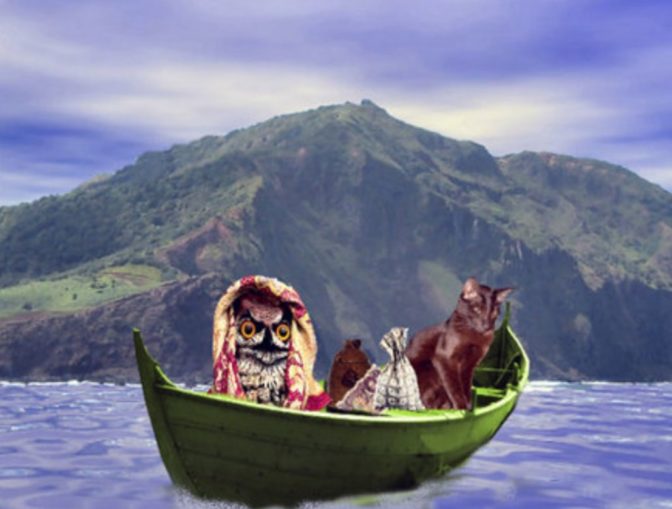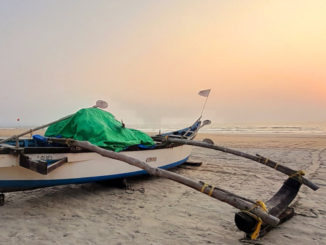It may interest some readers who commented on my first article to know that I was very conscious of Coleridge’s poem when choosing my pen-name because a few years after the events described here, whilst cruising in the Caribbean, I came across and bought a beautiful book containing all the verses of the “Rime of the Ancient Mariner”, with illustrations by Gustave Doré – here is a copy of the illustration to the first verse

Public Domain, via artpassions.net
The story continues –
Governments have been keen to legislate and regulate use of the sea ever since they found a need to raise money to spend on their own priorities. Some have lost power as a result of over-reaching themselves, like Charles I, whose 1634 attempt to levy Ship Money without Parliamentary approval was one of the causes of the English Civil War – and he lost his head in both senses of the phrase, as well as power.
In the United Kingdom today there is a vast quantity of Admiralty Law but a simpler set of Regulations for leisure sailors published by the Marine and Coastguard Agency (MCA) as a Marine Guidance Note. This describes principles the Agency considers to be good practice and exhorts people who are neither plying for financial gain nor have more than 12 people on board to train for and comply with the recommendations, and warns of possible prosecutions under the formal law if they do not.
By International standards this is a remarkable approach because the laws of many countries require all operators of leisure craft to be formally licensed. There are sometimes campaigns for that to become a requirement in the UK too (and at the rate Boris Johnson and Matt Hancock are going at time of writing that could happen here quite soon).
The development of International law is relatively recent with the United Nations Convention on the Law of the Sea (UNCLOS) being first agreed in 1982. The UN mainly leave individual countries to develop their own detailed legislation and enforcement mechanisms and all recognise the right of other signatories to do the same (160 countries agreed UNCLOS in 1982 and there are now 167 signatories including the EU who have elbowed their way into this organisation as well as others).
The UK adoption of a voluntary approach is almost certainly a consequence of two particular aspects of our history.
The first is our use of Common Law as distinct from more prescriptive Civil law used in the legal systems of many other countries. In Common Law past precedents and judgements are as important or more so than the original text of the laws under which a case arises. In Civil Law interpretation of the written text of statutes is of primary importance. I’d need to consult a lawyer before I could conclude whether one system is better than the other – and that could be expensive so I don’t plan to pursue the matter.
The second historical reason is the UK’s special role in the development of leisure sailing derived in the first instance from Charles II who loved Jacht Racing to which he was introduced when living in Holland during Cromwell’s Commonwealth, and about which his younger brother, later James II, was also keen.
From the sport of Kings in the seventeenth century, it became the sport of the Seriously Wealthy in the nineteenth, with the YRA (Yacht Racing Association) being formed in 1875 and evolving into the RYA (Royal Yachting Association) in 1952.
The RYA has long argued that Self-Regulation is more effective than Direct Legislation and has so far succeeded in convincing the Government of that, largely by establishing a hierarchy of well-known courses run by approved Training Schools with students being awarded certificates according to their degree of competence tested by approved Examiners from other schools.
Understanding this web of legislation and regulation was essential if I was to pursue the idea of becoming a leisure sailor myself and attending school would be vital in doing that and in gaining knowledge and experience of actually going to sea.
Sailing has a language of its own and some knowledge of many subjects is desirable from Astronomy and Biology through Machines and Navigation to Yardarms and Zoology.
Of course, it is possible, especially in Britain, to remain insouciantly ignorant and emulate Edward Lear’s Owl and Pussy Cat by “Going to Sea in a beautiful pea green boat, taking some honey and plenty of money ….” – that’s the sort of thing that might happen if no licence is required!

The RYA sail-training courses and certificates available in the late 1990’s for people interested only in leisure sailing, combined theoretical and practical knowledge in stages from a basic “Competent Crew” level through “Day Skipper”, “Coastal Skipper”, “Yachtmaster”,“Yachtmaster Offshore” to “Yachtmaster Ocean”, with “Commercial Endorsements” and “Yachtmaster Instructor” also available for those wanting to make a career in the field.
Some students take years to work their way through this chain of qualifications, attending night school for theoretical work in the winters and practical training on the water in the summer.
At 60 years of age I knew I didn’t have the luxury of doing that because I would be incapable of living the life by the time I was qualified to try it. Nor did I have concerns about a lot of the theory because I was confident my Maths Degrees and working experience in Engineering Companies would serve me well in those respects.
What I knew that I did need was a proper working knowledge of the Language, the Maritime Rules of the Road including Rights of Way, Light and Sound protocols identifying the different types of craft one might meet at sea, Buoyage Conventions, and so on. Above all I knew that I needed to experience being at sea and to get “hands-on” competence in those fields as well as the ones with which I felt theoretically comfortable.
After three or four weekends on a “Competent Crew” course at the first school I attended I was awarded that certificate after also attending a secondary course on operation of a VHF radio used for ship-ship and ship-shore communication over line of sight distances.
But, when I asked if I could get more practical experience in boat handling, the management said I’d have to enlist on a day-skipper course to do that. I didn’t feel I was ready for that and switched school to one that offered me a one-on-one course on marina maneuvering and on sailing to a fixed mark when being carried off-line by a strong tide (and tides in the Solent can be strong). As an even older mariner once said – “where she’s pointin’ baint as important as where she’s goin’ ”.
After that I did obtain a “Day Skipper” Certificate and attended a “Coastal Skipper” course.
But then, having decided I would go for this sort of life and buy my own yacht, I ran out of time and thus ended my acquisition of formal sailing qualifications.
I ordered my own boat in late 1995 but before it was delivered in June 1996 went in the New Year on a couple of overnight cross-channel cruises on a school boat, and on a charter boat cruise around Tenerife and Gomera in the Canary Islands with my youngest son and other customers.
That was particularly useful in one significant respect – learning how to moor a yacht in a harbour penetrated by Ocean Swell, including the use of a “Fender Board” to prevent the plastic fenders from being destroyed against a wall as the yacht rises and falls, and surges backwards and forwards with the swell. Experience being the daughter of mistakes and the mother of knowledge, I only learned that lesson after being Skipper one day and breaking the life-lines from which the fenders were suspended.
I also attended a specialist school and obtained a license to operate a short-wave radio – used in a similar way to VHF but over long distances made possible by bouncing signals off the ionosphere, and continued to educate myself about all things nautical as quickly as possible by reading anything and everything relevant that I could lay my hands on.
To be continued…
© Ancient Mariner 2020
The Goodnight Vienna Audio file



